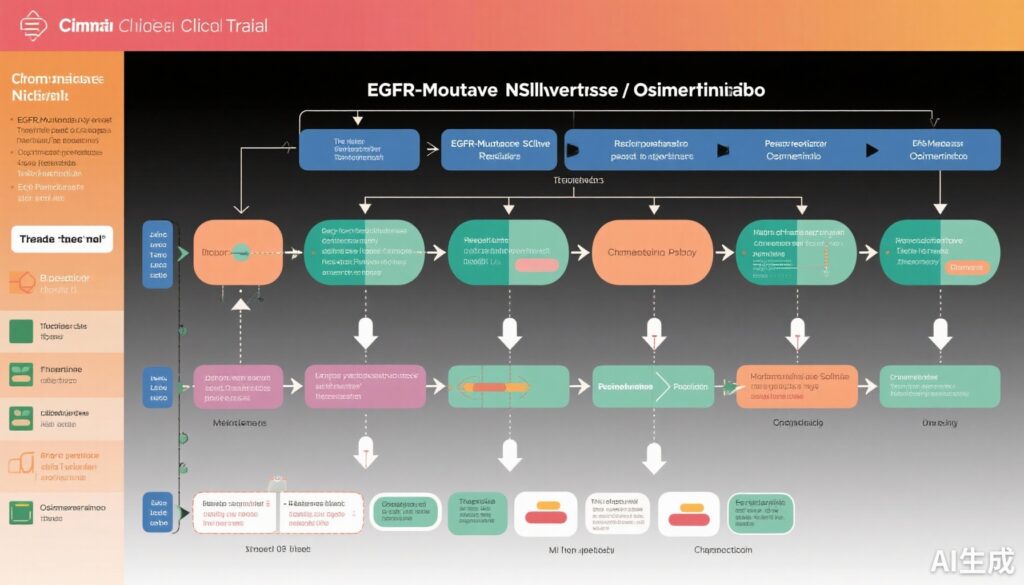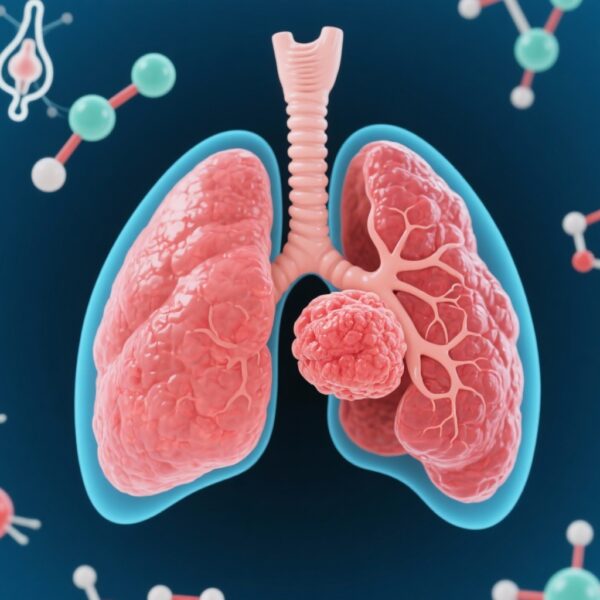Introduction
Non-small cell lung cancer (NSCLC) with EGFR mutations has seen significant therapeutic advances with the development of targeted therapies such as osimertinib, a third-generation EGFR tyrosine kinase inhibitor (TKI). Despite high initial response rates and improved progression-free survival, disease progression inevitably occurs, highlighting a critical need for effective subsequent treatment strategies. The NEJ025B study addresses this gap by investigating the efficacy and safety of combining afatinib, an irreversible ErbB family blocker, with platinum-based chemotherapy in patients with EGFR-mutated NSCLC refractory to osimertinib.
Study Design and Methodology
This open-label, single-arm phase II trial enrolled 36 patients with confirmed EGFR mutations (exon 19 deletion or L858R) who exhibited disease progression after first-line osimertinib therapy. Eligible participants received afatinib at 20 mg daily, combined with carboplatin (AUC 5 mg/mL/min) and pemetrexed (500 mg/m2) every three weeks. After initial combination therapy, patients continued with maintenance therapy of afatinib plus pemetrexed until disease progression or unacceptable toxicity.
The primary endpoint was the 6-month progression-free survival rate (6M-PFSR). Secondary endpoints included objective response rate (ORR), disease control rate (DCR), median progression-free survival (PFS), duration of response (DOR), overall survival (OS), and safety profiles.
Results and Efficacy
Out of 36 enrolled patients, one was excluded based on protocol violation, resulting in efficacy analysis of 35 patients. The primary endpoint, 6M-PFSR, was achieved in 57.1% of patients (95% CI: 39.3-71.5%), exceeding the predefined threshold of 35%, indicating the regimen’s promising activity in this resistant setting.
Long-term PFS benefits were observed, with 28.6% experiencing disease control lasting over a year. The secondary endpoints demonstrated notable activity: ORR was 51.4%, DCR was 88.6%, median PFS was 8.2 months, median DOR was 5.6 months, and median OS reached 22.5 months.
These findings suggest that the combination approach could serve as an effective second-line or later-line therapy for patients with limited options after osimertinib failure.
Safety Profile and Adverse Events
The most common adverse events were diarrhea (52.8%) and anorexia (47.2%), manageable with standard care. Interstitial pneumonia was observed in 8.3% of patients; two patients succumbed to complications—one due to interstitial pneumonia and another from sepsis—highlighting the need for vigilant monitoring. Overall, adverse events were consistent with known profiles of the drugs involved, emphasizing manageable safety with careful management.
Discussion and Clinical Implications
The NEJ025B trial provides evidence supporting the efficacy of combining afatinib with platinum-based chemotherapy in a challenging patient population with acquired resistance to osimertinib. The observed PFS and OS benefits are encouraging, given the limited options after third-generation TKI failure. Importantly, the safety profile was manageable, although severe adverse events like interstitial pneumonia underscore the importance of close surveillance.
Limitations include the trial’s single-arm design and relatively small sample size. Further randomized controlled trials are necessary to validate these findings and compare this approach against emerging therapeutic strategies.
Conclusion
The combination of afatinib with pemetrexed and carboplatin demonstrates promising efficacy and tolerability in EGFR-mutated NSCLC refractory to osimertinib. This regimen could become a valuable treatment option, filling an unmet need in the post-osimertinib setting, pending further confirmatory studies.
Funding and Trial Registration
This study was registered under the trial number jRCTs021200005, highlighting its transparency and adherence to clinical research standards.
References
Nagashima H, Fukuhara T, Utsumi Y, et al. A phase II study of afatinib in combination with pemetrexed and carboplatin in patients with EGFR mutation-positive non-squamous, advanced non-small cell lung cancer (NSCLC) refractory to first-line osimertinib treatment: NEJ025B study. Eur J Cancer. 2025 Oct 16;229:115693. doi: 10.1016/j.ejca.2025.115693. Epub 2025 Aug 20. PMID: 40957291.



